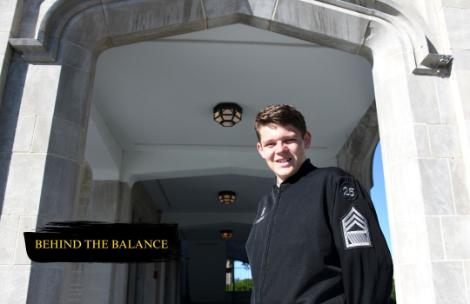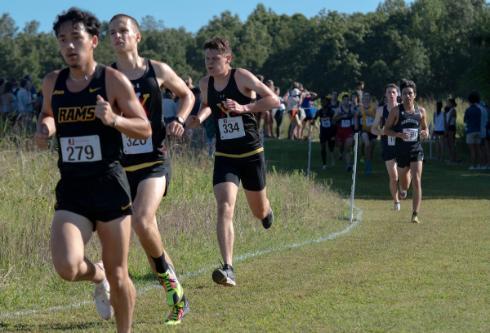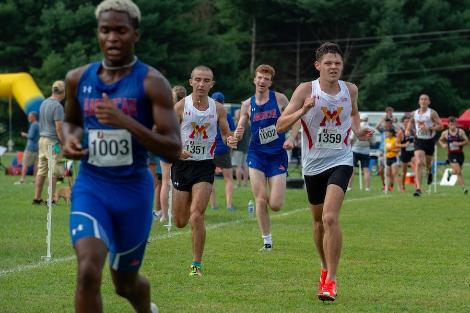Behind the Balance: Patrick Kiernan ’25 — Keydet Cross Country
Virginia Military Institute’s cadet-athletes have to juggle cadet life, heavy academic course loads, and their NCAA Division I sport. Committed to both academic and athletic pursuits, balancing their rigorous schedule in both sports and school requires a certain level of commitment and discipline. Behind the Balance is a series that focuses on those cadet-athletes and how they handle the hurdles of the day-to-day.
LEXINGTON, Va. Oct. 28, 2024 — Community is something Patrick Kiernan ’25 values in his life. It’s one of the reasons he chose to go to Virginia Military Institute and also a big part as to why he’s on the cross country team.
He started running at a young age, thanks to a cross country camp he attended with his cousin. 
“I enjoyed it, not just the sport, but the community that camp built,” he said. "I decided to do it in high school, and I really enjoyed just that sense of community I had with my teammates. I think I was a lot closer than other sports teams I had been on in middle school and elementary school.”
He continued running through high school and by his junior year, he was contacting the coach at VMI to inquire about running there. He had to track his times and give the coach updates, to show the progress he was making. Then a couple days after Matriculation Week, he was able to join the team practices.
When he first started on the team, he was averaging about 45 to 60 miles a week. Now, it’s between 60 and 80 miles.
“The longest I'll go is 16 miles, but it depends on the day. So, some — we call them a maintenance or a recovery run — will be, for me, around eight to 10 miles,” he said. “Our harder days will usually be around 10 to 13 miles. Then usually we'll have one really long run of about 12 to 16 consecutive miles.”
To keep occupied during the longer runs, Kiernan says he’s usually running in a group, so they’ll all talk to each other.
"When I'm on my own, my mind just kind of wanders. On a busier day, I might just be thinking about planning out my week or my day, like how I'm going to get things done,” he said. “Every once in a while, I’ll have earbuds in and listen to music. ” 
Kiernan keeps a tight schedule, as do most cadets. He’s asleep by 10:30 p.m. after a full day of activities. The history major has found the busier he is, the more time he has to finish tasks. The constant movement and busyness allow him to stay focused. He participates in several clubs and serves as a S7 lieutenant, which deals with cadet life and is responsible for the general well-being and morale of the Corps of Cadets. He’s also a cadet chaplain.
“Last year was probably one of my busiest years as a cadet, where I had a bunch of different obligations. I had my rank, being on the team, I was also president of the Newman Society, vice president for Pre-Law Society. I constantly had stuff I was doing,” he said. “I think a lot of it was trying to prioritize, my sleep and not staying up super late. I found those little bits in the day and figured out how long it took me to get an assignment for class done or get something done. It was more just figuring out the little moments in the day I can use to get a little bit of work done, and then that just built up.”
Cadet-athletes at VMI not only have their responsibilities with their selected sport but cadet duties on top of that. Cadets are also required to take physical fitness classes twice a week, participate in ROTC all four years, prepare for room and uniform inspections, practice for parade, guard duty, and more.
“I think it was a lot about just me prioritizing getting work done in the day, so you have less to do at night,” he said. 
He said being part of cadre has helped him establish a way to manage his time. During Cadre Week, he had to figure out what to make a priority due to multiple meetings and rank responsibilities.
"It was deciding which ones were a higher priority that I needed to be at and then which ones I could just have someone fill me in on what it was about,” he said. “I think even throughout the school year, it's a similar thing of figuring out what needs to be done immediately and what can wait, or what I should start on early, so it doesn't become a problem later.”
He believes VMI has built up a certain discipline in his work ethic and how he approaches problems.
“I've noticed that being at VMI, when they talk about discipline, it's not doing the insane hard, workouts and stuff every day. A lot of it's just doing those small things you don't really want to do, like getting up early,” he said. "I think that adaptability is a big thing. There's a lot of sudden changes, military or non-military life, where things just come up. I think it's helped me be fairly adaptable, where I can just on the fly make an adjustment in my schedule or in my day to figure out how to get a lot of things done.”
Laura Peters Shapiro
Communications & Marketing
VIRGINIA MILITARY INSTITUTE
.svg)
.png)